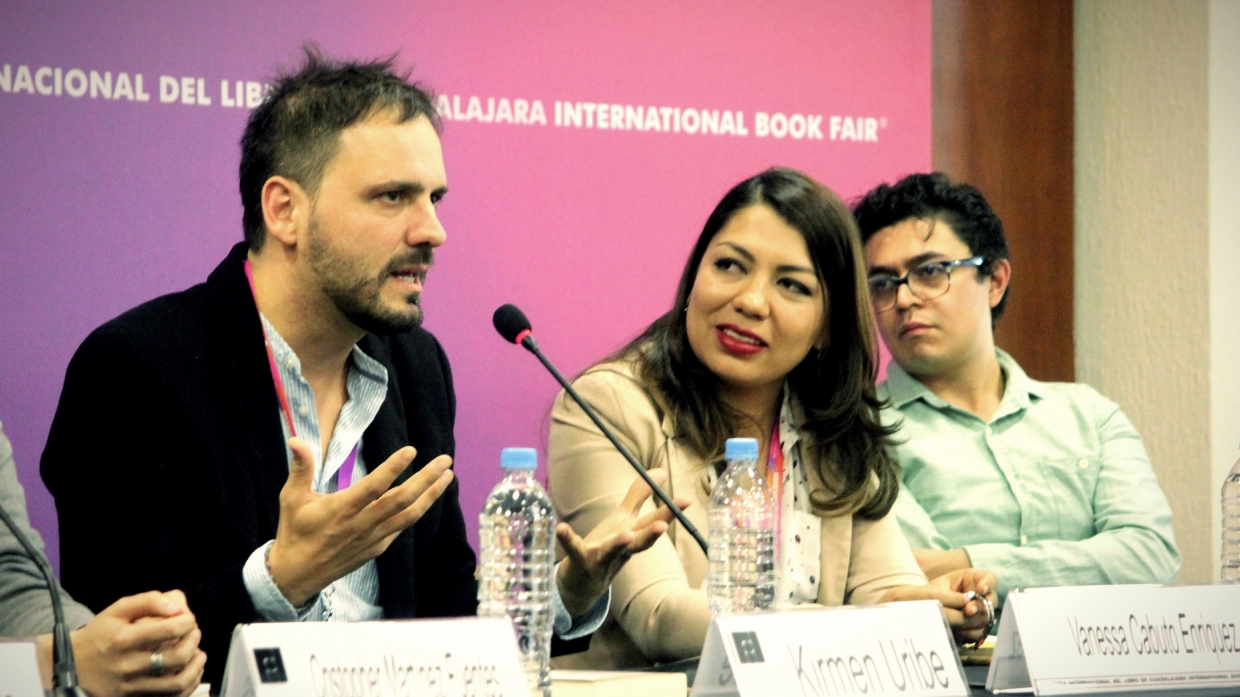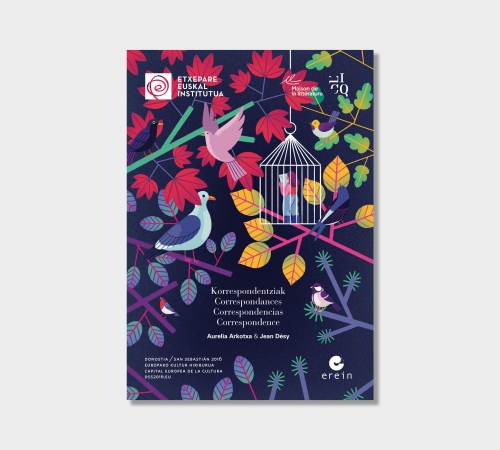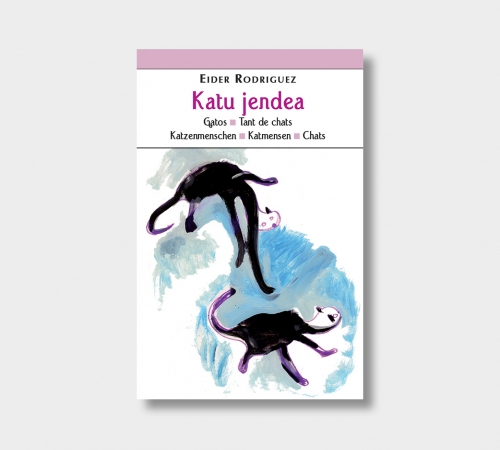Literature
Euskara. Kultura. Mundura.
 Literature
Literature Basque literature is one of the most lively and prominent expressions of contemporary Basque culture. Its linguistic diversity and rich themes keep it in ongoing conversation with the major debates of world literature, all while remaining rooted in a unique cultural identity.
From the earliest medieval texts to the present day, literature written in the Basque language, or Euskara, has evolved into a vibrant and diverse literary system that includes a wide range of genres from poetry, crime novels, essays, children´s and young adult literature to comics. This vitality reflects the dedication and creativity of generations of writers who have been able to renew literary styles and themes from a contemporary perspective.
In recent decades, literature in Euskara has seen a remarkable diversification of voices, styles and approaches. Contemporary authors have expanded its aesthetic horizons, exploring everything from magical realism and experimental poetry to social novels. At the same time, a new generation of creators is establishing a diverse and innovative literary scene with an increasing international presence, fuelled by translations into other languages and adaptations of works into media such as film and television.
This literary tradition´s future is revitalised with renewed strength through its continuity, secured by supporting reading in Basque – especially among children and young people – via a diverse and high-quality selection of works.
Historical keys to Basque literature
The history of Basque literature has its roots in oral tradition, with songs and improvised verses, or bertsos, that transmitted the collective memory of the Basque people. However, the first written milestone in Euskara came with Linguae Vasconum Primitiae (1545), the first book printed in the Basque language by Bernart Etxepare, marking the beginning of written Basque literature. For centuries, literature in Euskara was primarily linked to religious and educational texts, but from the nineteenth century onward, authors like Jose Maria Iparragirre drove its modernization. The twentieth century brought significant renewal: before the Spanish Civil War, poets like Lizardi and Lauaxeta revolutionised Basque poetry through a modernist approach. The post-war period, marked by silence under the dictatorship, gave way to a resurgence in the 1950s. This revival, along with the growth of Basque publishing houses, encouraged the publication of books in Basque, such as Harri eta Herri by Aresti and Etiopía by Atxaga. This period consolidated Basque literature as a diverse and constantly evolving system, able to adapt to global trends while maintaining its essence.
The current Basque literary system
The Basque literary system today is a vibrant, constantly evolving reality. The sector has established itself as a cultural field with its own structure: publishing houses, renowned authors, a stable readership, public policies to support literature, and an increasingly professionalised media and distribution network. Although this evolution has not been entirely linear, it has transformed from a traditionally oral culture into a complex cultural ecosystem with its own structure, featuring a remarkable diversity of voices, styles, and genres. In this context, the Basque literary system is not only a field of artistic creation, but also a key instrument for maintaining the cultural vitality of a minority language community. In short, it is a space that daily challenges, inspires, and shapes the imagination of the country.
Furthermore, literature written in Basque has gained international recognition thanks to the sustained work of translators who are opening the way for new readers beyond the Basque-speaking world. Institutional support and growing interest in unique literary voices have contributed to this momentum: in the last decade, more than 400 works originally written in Basque have been translated into some thirty languages, placing Basque literature in publishing circles, international book fairs and leading literary festivals. Translation, therefore, is not only a gateway but also a strategic tool for gaining international visibility.
The leading names of Basque literature
The group of authors that forms Basque literature has been instrumental in shaping a robust, innovative literary system that is open to the world. Their contributions have enriched the Basque cultural landscape and engaged with the great debates of world literature from their own diverse perspective. In the twentieth century, figures like Gabriel Aresti, with his work Harri eta Herri, and Bernardo Atxaga, with Etiopía and Obabakoak, revolutionised poetry and fiction in Basque. Fiction also grew richer with genres like the social novel, magical realism and experimental literature, shaped by authors such as Ramon Saizarbitoria and Anjel Lertxundi. The incorporation of feminist theories, spearheaded by women Basque writers such as Arantxa Urretabizkaia, brought new perspectives in literature. Today, writers like Eider Rodríguez and Katixa Agirre have established themselves in genres such as crime fiction and contemporary fiction. Kirmen Uribe, Harkaitz Cano and Unai Elorriaga stand out for their ability to innovate and connect with global readers. In poetry, names such as Castillo Suarez and Jon Gerediaga represent the vitality of Basque lyricism. Basque children´s and young adult literature also occupies a prominent place, with figures such as Juan Kruz Igerabide and Patxi Zubizarreta, who, together with Basque illustrators, have cultivated a passion for reading and language from an early age.
Basque female authors transforming contemporary literature
One of the most significant aspects of this transformation has been the unstoppable rise of a large number of female writers. Far from taking a marginal role, authors including Arantxa Urretabizkaia, Itxaro Borda, Katixa Agirre, Miren Agur Meabe, Uxue Alberdi, Eider Rodríguez and Irati Jimenez – among many other – have played a key role in redefining the literary canon and renewing themes, perspectives, and styles. From narrative and poetry to essays, theatre and comics, Basque female writers are shaping today´s literary landscape with their own bold, diverse, and committed perspectives. These writers have not only enriched narrative but have also broken down barriers by highlighting female experiences in a cultural context traditionally dominated by male voices.
Do you want to learn more about Basque literature? Download this book for free.
Related content
-

Literature
Do you want to know more about Basque literature? Download this book for free. (Basque - English). Basque - French and Basque - Spanish versions are available by browsing the website in Basque and in Spanish respectively.
-

Basqueculture.eus
Visit Basqueculture.eus and get inspired with articles and stories about our culture and society.
-

10 things to know about Basque culture
It’s not easy to condense the culture of a country into a brief brochure. This is an attempt to spark curiosity and encourage readers to learn more about the Basque language, culture and contemporary creation
-

Correspondence: Iban Zaldua & James Robertson
Exchange of letters between the Basque writer Iban Zaldua and the Scottish writer James Robertson.
-

Correspondence: Aurelia Arkotxa & Jean Désy
Exchange of letters between the Basque writer Aurelia Arkotxa and Quebecois writer Jean Désy.
-

Anthology of Basque Oral Literature
Compendium of Basque oral literary expression, demonstrating the variety and diversity of the tradition.
-

Contemporary Basque Narrative: A Catalog
Selection of 25 Basque authors of fiction and their most significant work.
-

Contemporary Basque Literature for Children and Young People: A Catalog
Compilation of Basque authors of children’s and young adult fiction and their most popular work.
-

AT!
Collection of pieces by several Basque authors for the Etxepare Basque Institute’s presentation at the Arriaga Theatre, reflecting reflect the spirit, philosophy and principles of Institute.
-

The Fighter
This book features three stories written by Bernardo Atxaga. Three different stories, one overarching narrative.
-

Katu jendea
Katu jendea tells two parallel stories that revolve around desire, using cats and people as protagonists. The book is in Basque, Spanish, French, German and Dutch.
-

Flexible is the Night
Inspired by Chopin´s Nocturnes, Harkaitz Cano harmonizes words with music.
-

Non omnis moriar
Anjel Lertxundi tells us in first person about his visit to the home of Madame Meyle.
-

Poeta ibiltariak / Poetes itinerants
This collection of poems aims to show the exchange that has taken place between Basque and Catalan poets.
-

Euskal Editoreen Elkartea (EEE)
EEE, the Basque Language Publishers Association, brings together publishers that print material in the Basque language. The main aim of the association is to promote and protect Basque publications.
-

Euskal Idazleen Elkartea (EIE)
EIE is the association of Basque language writers whose aim it is to defend their rights and promote Basque literature in the Basque Country and around the world.

